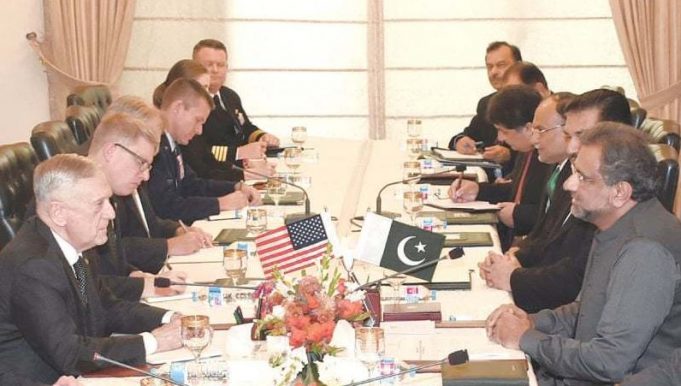Jan Achakzai |
The United States Defence Secretary Jim Mattis’s important visit to Islamabad comes on the heels of other high profile bilateral visits by functionaries of the two countries. As US-Pakistan ties are moving into a phase of normal transactional relations, both governments (Pak-US) are working to preserve the bilateral convergences.
The downward spiral has been arrested by both sides with the US coming up with a public narrative of giving “another chance” and Islamabad pulling off a spectacular release of kidnapped US and Canadian nationals from the hands of terrorists in the Pak-Afghan border region, sending a message of cooperation and robust engagement.
Islamabad Eschews Escalation
What is clear is some straight and candid discussion will take place between Defence Minister Mattis and Pakistani officials with both sides expected to back down a notch from their previous extreme positions.
In the post West/South Asian policy announcement of the Trump administration, Pakistan consulted its Ambassadors & regional allies to calibrate its position. What angered Islamabad in particular was the glorification of India and demonisation of Pakistan additionally envisaging some sort of role for New Delhi in Afghanistan.
Read more: US Secretary of Defence Jim Mattis arrives in Islamabad
However, immediate efforts of the US Ambasador David Hale behind the scene meeting both civilian and military officials in DC and Islamabad, cooled some nerves to find common ground producing some new positions.
Pakistan is since then clearly signalling a less confrontational approach followed by several moves to reduce frictions. Army Chief General Bajwa offered his Afghan counterpart to suggest him any mechanism to check the Haqqani network- a bone of contention between the US-Pak-Kabul trilaterals. The offer was publicly acknowledged by the Afghan Ministry of Defence.
No Kinetic Space
Islamabad was convinced that it has no kinetic space to offend the US who could adopt a more aggressive posturing in the post South Asia policy milieu. Yes, China and Russia would help. But they would not be helpful in responding to offensive US moves. It could be more then drones accentuating Pakistan’s dilemmas on borders in the form of skirmishes.
Rupture was avoided also courtesy of the Pro-American lobby in Pakistan and DC who worked over gear to help policy makers on both sides to deflect and dilute the US pressure for the time being.
Rupture was avoided also courtesy of the Pro-American lobby in Pakistan and DC who worked over gear to help policy makers on both sides to deflect and dilute the US pressure for the time being.
This is why the State Department publicly acknowledged “the US gives importance to Pak-US partnership” softening Trump’s anti Pak rhetoric.
Read more: James Mattis warns Pakistan; ‘Do more’ or face consequences
Being “Singled Out”
Pakistan also realised the possible negative impacts of being “singled out” by the US for example:
- A) The US could impose a loan squeeze with the IMF, WB & also discourage Chinese private investors eventually undermining CPEC’s potential as linking of the two economies.
- B) Possible withdrawal of FATF certification for Pakistan’s banking sector as Anti-money laundering and Anti-terror financing measures, at the UN on the US behest, might deprive Pakistan of remittances through officials channels.
- C) Pakistan might lose the US export market & G-plus status in the EU and hence its market access, depriving the nation of its highest two trading partners.
- D) Possible Iran like sanctions might create dreaded prospect for turning Pakistan into a barter economy affecting its imports as well.
Read more: General Bajwa wants an end to “timed blame-games”
Where US Depends on Pakistan
On the positive side, Pakistan’s contribution to the US security in terms of dismantling the al Qaeda Network was a positive legacy to remind everyone of robust cooperation between the countries.
However, immediate efforts of the US Ambasador David Hale behind the scene meeting both civilian and military officials in DC and Islamabad, cooled some nerves to find common ground producing some new positions.
The US reliance on Pakistan’s G-A LOCs to sustain supply for its troops in Afghanistan was another positive to serve as a break on any unraveling of relations.
Last but not least, Pakistan’s role both actual and potential for the region’s nuclear stability and security as a net contributor converged with the US’s core interest in sustaining a stable nuclear regime in the region at large.
What is clear is some straight and candid discussion will take place between Defence Minister Mattis and Pakistani officials with both sides expected to back down a notch from their previous extreme positions.
Jan Achakzai is a geopolitical analyst, a party leader in the ruling PML-N party, and advisor to Balochistan Government on media and strategic communication. He remained associated BBC World Service in London covering South and West Asia. The views expressed in this article are the author’s own and do not necessarily reflect Global Village Space’s editorial policy.














